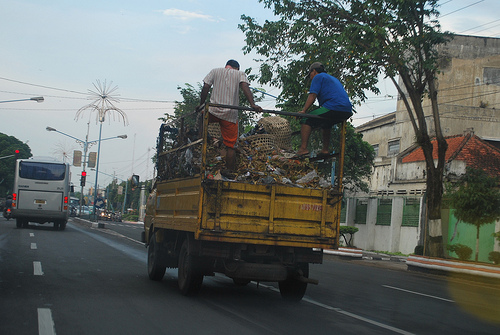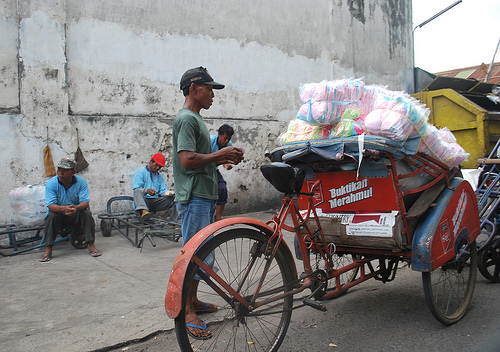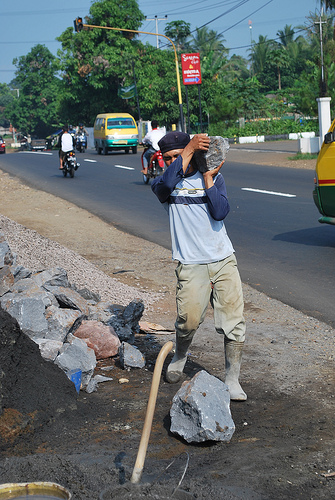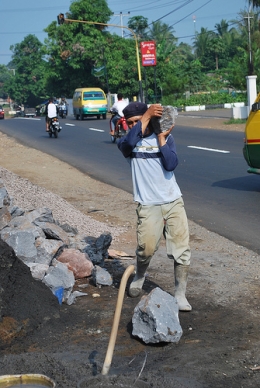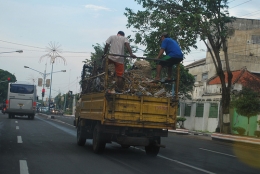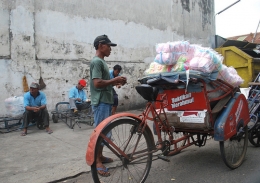Giving informal worker more rights, access to services and a voice, while reminder reminding them of their duties as citizens, will not only contribute to development and the reduction of poverty but will also bring societies closer together (Jutting, J, and Laiglesia, J.R. De, 2009)
Up to February 2012, out of 120.4 million Indonesian workforces, 112.8 million of them are absorbed into labour market. From the figure, 42.1 million workers (37.29 percent) are in formal sector while the remaining 70.7 million workers (62.71) work in informal activities (BPS, 2012). There are an increasing number of those who work in informal sectors compared to 2004, 65.29 million, and decreasing number compared with 2010 statistic that were 73.67 million workers (or 65.58 percent) work in informal activities (BPS, 2010) [caption id="attachment_189806" align="alignleft" width="335" caption="Manual labour in construction site in Indonesia. Photo by Indah Budiarti"][/caption] The significant growth in number of workers works in informal sectors is an interesting phenomenon. It may be said that the more advance an economy of a state the more significant roles formal sectors play in it, not the opposite. However, in Indonesia case elasticity of informal sectors has made the country survive from economy crisis and kept, on the other hand, its economic dynamic despite less value-added they generate. Nonetheless, their existence is seemed to be marginalized and not linked to mainstream economy, especially situation surrounds workers in these sectors. Those who work in the informal economy can be easily determined according to their employment status and bad working conditions. Despite their contributions to generate this country economy, their existence is often invisible from labour regulations and social protection. To provide workers of these sectors with a decent working condition it, therefore, requires government to set up appropriate regulations, laws and policies to correct biases in existing regulations, laws and policies that favour only the formal workers and disadvantage informal workers Definition of informal workers Social Alert Report (2005) defined the informal economy as a broad range of activities not fitting into the regulated economic framework, but exists all over Indonesia. It covers everything from hawkers selling personal services on the streets or to private households to family farmers, casual agricultural labourers and unregistered contract labour. As for Biro Pusat Statistik (BPS-National Statistic Bureau) formal and informal activities population does are determined based on employment status. And for simplicity in calculating statistical data on working population, BPS makes seven categories to distinguish formal and informal workers (BPS, 2010) (Tabel 1) Table 1 Main Employment Status Formal Workers 1) Employer assisted by permanent worker 2) Employee Informal Workers 3) Own Account Workers 4) Employer assisted by temporary worker 5) Casual in agriculture 6) Casual workers not in agriculture 7) Unpaid worker Source: Labor Force Situation in Indonesia on February 2010 (BPS online, 2010) However, workers, whether those in the formal or informal sector, encounter the same family/personal issues that often undermine their well-being and livelihood: illness, property loss, disability, old age, and death. But because of the very nature of informal employment, informal workers do not enjoy the same social protection mechanisms that come with formal employment. Also, in general, informal workers do not have job security and receive very little benefits from employers. Therefore, International Labour Organization (ILO) defines informal workers as those who do not have secure employment contracts, worker’s benefits, social protection or workers’ representation (ILO Thesaurus 2005). ILO restates it definition on informal workers in its report ILO Decent Work and Informal Sector (2002, pp. 3), when saying that another useful way of describing the situation of informal workers is in terms of seven essential securities which are often denied them: (1) labour market security; (2) employment security; (3) job security; (4) work security; (5) skill reproduction security; (6) income security, and; (7) representation. Based on description above, it could be understood if one may think that Law No. 13/2000 on Manpower explicitly does not provide protective framework of informal workers which it should protect. Meanwhile, the definition of worker under this law is any person who works and receives wages or other forms of remuneration. In other words, under this definition of the Law there is no distinction between formal and informal workers. Informal workers: activities and scope To make it easy on identifying informal sectors, they are usually categorized under rural- and urban-based activities. Rural areas until recently dominates informal sector, especially in agriculture field and usually involves family farming and small informal services. As in fact, agriculture is main priority in Indonesia economy development and there are 42.83 million people or 39% of workforces active in this field (BPS, 2010). However, because of population growth land for agriculture has been decreased gradually and this fact has forced some part of young people to move to urban for living. Lack of or mismatching in skills and education qualifications for aspired jobs have become main obstacle for these youngsters getting aspired jobs and forced them to turn their fate into informal sectors. The author observed that in some Indonesia big cities (Jakarta, Surabaya, and Bandung) options to be street-sellers, tukang parkir (job that arrange cars or motorcycle to park unofficially on streets), tukang becak (especially in Surabaya and Bandung), street-musicians, scavengers, maids and porters at traditional markets and harbors have been solutions for they make a living without proper education and skills. The application of labour market flexibility has also impacted upon informalization of formal work. Industry with their various reasons and especially for their production-efficiency strategy has created this informalization process and made informal sectors bigger than ever. This is only a consequence of changing in capital strategy industry use to accumulate more profits and to weaken bargain position in worker side. [caption id="attachment_189804" align="alignleft" width="350" caption="Garbage collectors, risk their life. Photo by Indah Budiarti"]
[/caption] This situation can be seen obviously at textile and garment industries in cities of Tangerang and Pasuruan which employ massive contract, outsourced, and low-paid workers (AKATIGA online). Situation the this industries workers facing in these cities are worsened by the mentioned Law (No. 13/2000) which instead of supporting improvement in working conditions of these workers but legalizes sub-contract system for workers and outsourcing and provides them with no visible protection. Meantime, because of pressure they experience in their original villages, a growing trend of women in rural areas is to work overseas as domestic workers. The causes of migration can generally be traced down to economic reasons which forced them to escape from the poverty in family and support for their families. It is reported that in 2007, 23.6 million rural Indonesian is living below the national poverty line (Rural
Poverty online). Within context of migrant workers, both formal and informal workers now experience an interesting phenomenon which is feminization of their jobs. According to World Bank, in 2004 the number of registered Indonesian migrant workers was 380,688 persons. Of this number, 83% are women. The majority are from selected regions, such as West Java (Sukabumi, Cianjur, Indramayu); Central Java (Cilacap, Wonosobo); Yogya (Kulon Progo); East Java (Malang, Kediri,Ponorogo); East Nusa Tenggara, West Nusa Tenggara, South Sulawesi, Lampung. Women and migrant workers, most of them work as domestic workers who are inclined to be isolated and vulnerable, especially those who are live-in with their employers. They are dependent on the good or bad will of their employers. They are also excluded from the provisions of labour law and social security protection, and many of them work with poor working conditions or as Migrant Forum (1998) said they are on three Ds: dirty, dangerous and difficult
. It may be said that domestic workers represent biggest part of informal workers of which women are the majority, both abroad and in the country. Despite the important role of domestic workers in the household and overall economy, domestic work is still not recognized as work. This is so because private households are not accounted into work-place in Indonesia and some other countries as well. Logical consequence of this circumstance, most of their working relation with their employers does not refer to effective labour law. However, it might be because of their unrecognized employment status that they get no protection under labour law and regulations. Another phenomenon within informal sectors causes a concern is a tendency to employ children. Poverty has dropped the children out of school and forced them to enter labour market in order to help their family economic. Family farm, small-scale manufactures and vendors are presumably the main actors netting these green youngsters. In most cases, worse situation is experienced by these young generations in forms of unpaid employment, very low-wage, and in worst case sexually exploitation and girls trafficking to become young prostitute. Related to the ILO (2004), firmly states that trafficking for sexual purposes or trafficking for prostitution is a contemptible violation of human rights and is one of the worst forms of child exploitation. Though legal mechanism is made available to protect the rights and interests of children, there are still many Indonesian children who are in a danger of being easily trapped into exploitative condition.
Basic labour standards and protection of workers rights [caption id="attachment_189801" align="alignleft" width="350" caption="Becak driver well-know in Solo city. Photo by Indah Budiarti"]
[/caption] Informal workers are simply easily to be identified different with the workers in formal sector. Those who work in the informal economy can be easily classified according to their employment status and bad working conditions. Works classified as precarious jobs, danger and exploitative which are out of reach of most laws and policies are applicable to the informal sector and within each of the classifications we may see many under-age children who work with same amount of time as adults’. On 2010 ILO reports that there are about four million Indonesia working-children and 1.76 million children from that figure are categorized as child-labours. Besides, around 20,7 percent of all working-children works under dangerous conditions, for example, they work for more than 40 hours per week. As stated above, existence of informal workers is often overlooked from labour regulations and social protection. However, ILO Conventions are supposed to be and should be applied to all workers, including those in the informal sector. Indonesia was the first country in Asia that has ratified all eight core ILO Conventions covering the fundamental principles and rights at work: (1) Conventions No. 87/1948 and No. 98/1949:
Freedom of Association and the effective recognition of the right to collective bargaining; (2) Conventions No. 29/1930 and No. 105/1957:
Elimination of all form of forced labour or compulsory labour; (3) Conventions No. 138/1973 and 182/1999
: Effective abolition of child labour; (4) Conventions No.100/1951 and 111/1958:
Elimination of discrimination in respect of employment and occupation. However, “Absenteeism of law enforcement culture” in Indonesia is allegedly one of factors raising doubts over the implementation of the conventions. In addition, since most of informal workers normally is not organized, they are therefore not able to enjoy, exercise or defend their fundamental rights at work. Informal sector workers are only rarely referred to explicitly in the actual texts of Conventions and Recommendations of the ILO, either to exclude or include their application to such workers (Schlyter, 2002/3, p. 5). However, aspect of social protection to the informal sector has been expressed through the Employment Policy (Supplementary Provisions) Recommendation, 1984 (No.169):
29 (1) While taking measures to increase employment opportunities and improve conditions of work in the informal sector, members should seek to facilitate its progressive integration into the national economy. The Labour Administration
Convention, 1978 (No.150) also maintains that
the functions of the system of labour administration to include activities, to be carried out in co-operation with other competent bodies, relating to the conditions of work and working life of appropriate categories of workers who are not, in law, employed persons (article 7) (Schlyter, 2002/3). Above all, the existing Conventions contents were intended to apply to all workers without distinction. So, of course they should also be including workers in the informal economy, as I mentioned above. However, ratification of the Conventions is not only about process of signing remarkable documents but needs strong political will from government and strong pressure of the workers and its unions in particularly for effective implementation. And by ratifying the Conventions, the country must bear consequences to provide necessary labour laws which are fully complied with the requirement of the conventions. Such laws need to be developed. Such laws should provide general and specific guideline in applying principles of the conventions and must be undertaken at the national level and having regards to national circumstances. But the laws of the land shall not be such as to impair, nor to shall it be so applied as to impair, the guarantees provided for the conventions. However, ILO does not have a power to provide certain nations with a sanction as they, which ratified the conventions, make an infringement. Serious obstacles more than often arise as national regulations are not capable of assuring rights standardized in the conventions for all workers to enjoy.
Conclusion The informal sector represents an important part of Indonesia economy and certainly of the labour market in many countries, especially developing countries, and thus plays a major role in employment creation, production and income generation. However, the informal sector represents the situation of absence of state policy to regulate appropriate policy. Therefore, the workers in informal sector are neglected or marginalized from the laws and provisions that cover protection and rights at works. Solution for this situation needs to be proposed to government by
union and its employers: how can informal workers enjoy benefits from regulations as ones set up by government for workers at formal sector?; Is special regulation needed to regulate and protect their interests? And how does it looked like? Even though Constitution of the State guarantees that every citizen shall enjoy their rights and social interests, however, circumstance surrounding informal sectors is still a challenge in achieving this universal goal. In fact, Indonesia holds onto welfare state model but this model gradually loses its legitimacy as free-liberal market penetrates into almost every government policy. It is undeniable that there is a huge migration of workers from formal to informal sectors. This might be caused by some factors: (1) prolonged economy crisis that causes stagnation in employment and even dismissal of existing workers as companies could not sustain their operations; (2) technologies also play significant role in creating a worker migration from formal to informal sectors; (3) increasing trend to use outsourcing or contract- or temporary-labours. It’s also undeniable that informal sectors have become survival valves in crisis time. But the growing trend of informal sectors has also risen a concern over employment status of the workers. It is understandable that it would be very difficult for industry such as home-industry producing
tempe (Indonesian food made of fermented soya-bean) with 5 to 10 employees to adjust its wage structure with regional minimum wage, or to register the workers in Jamsostek (national worker assurance program) or to allow them to establish union. Situation such as that make it difficult to provide sufficient protection for the worker. However, this situation should not be an excuse to discriminate against them and there are possibilities to improve their employment status. Only strong political will from government is needed to open door for recognizing informal workers as worker so they shall enjoy protection as one enjoyed by their other counterparts.
Follow Instagram @kompasianacom juga Tiktok @kompasiana biar nggak ketinggalan event seru komunitas dan tips dapat cuan dari Kompasiana
Baca juga cerita inspiratif langsung dari smartphone kamu dengan bergabung di WhatsApp Channel Kompasiana di SINI
Lihat Politik Selengkapnya
